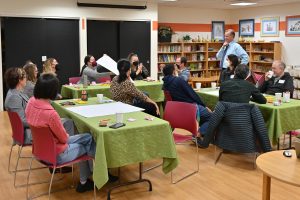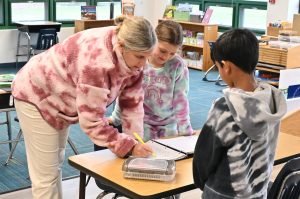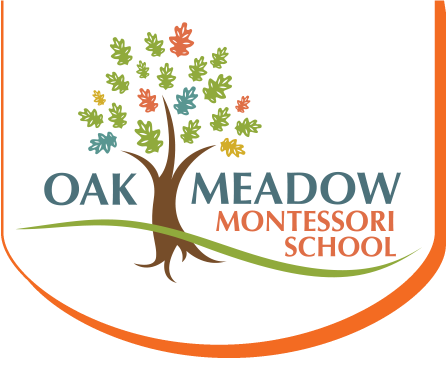 During the Friday morning parent coffees, we’ve discussed many trends in education, including the shift to mastery-based learning. Many innovative educators today advocate for a shift to mastery-based learning for all schools. This makes a lot of sense to Oak Meadow teachers, since this is what we’re already doing through our Montessori approach.
During the Friday morning parent coffees, we’ve discussed many trends in education, including the shift to mastery-based learning. Many innovative educators today advocate for a shift to mastery-based learning for all schools. This makes a lot of sense to Oak Meadow teachers, since this is what we’re already doing through our Montessori approach.
I hope my blog this week will help to clarify WHAT mastery-based learning is, WHY it is an important change to make in schools, and HOW it’s already at the core of what we strive to do at Oak Meadow.
 To provide you with clarity about mastery-based learning from a national perspective, I’d like to introduce you to an author named Michael Horn, who I have worked with over the past year in partnership with a few other Montessori school heads in Massachusetts. Michael has provided a succinct overview of mastery-based learning in his latest book, From Reopen to Reinvent: (Re) Creating School for Every Child, which is on the faculty reading list at Oak Meadow. Here are some of my key takeaways after reading his book this summer:
To provide you with clarity about mastery-based learning from a national perspective, I’d like to introduce you to an author named Michael Horn, who I have worked with over the past year in partnership with a few other Montessori school heads in Massachusetts. Michael has provided a succinct overview of mastery-based learning in his latest book, From Reopen to Reinvent: (Re) Creating School for Every Child, which is on the faculty reading list at Oak Meadow. Here are some of my key takeaways after reading his book this summer:
What is Mastery-based learning?
- Mastery-based learning is focused on ways that students are learning and growing week by week.
- It’s a process that includes clear standards and yet adapts to each individual student. Even though the learning outcomes are clear, how a student gets to that result is adjusted for the individual.
- Short-term assessments verify mastery of objective concepts along with rich projects that measure what students can do with both knowledge and skills combined.
- Using this approach, students are motivated to make progress because they have clear goals and regular feedback.
- Content is customized to be delivered “just above” each child’s current capabilities. Students work on problems that are the “right” level of difficulty (not too difficult and not too easy)
Why the traditional feedback and approach to student assessment is ineffective
- Exams are offered every few weeks.
- Students are categorized as excellent, average, and below average.
- Student advancement to the next grade or subject level takes place regardless of individual student mastery or achievement.
- Students receive feedback at the end of a cycle or year, but can’t do anything with that data or feedback. That process doesn’t support continued learning or improving.
- Traditional grades don’t offer much objectivity about student learning.
- Traditional grades fix labels on students.
- The traditional feedback approach to assessment results in many students not feeling successful.
Ways we are working to demonstrate mastery-based practices here at Oak Meadow
- Students articulate what they are trying to accomplish (goals).
- Students make a plan with the teacher to reach those goals.
- Students show evidence of their learning (using materials, writing papers, giving a presentation, etc.)
- Teachers spend time clarifying how they will know when a student has demonstrated mastery for each learning goal. What is the evidence they would need to see?
- Students receive timely feedback on their work and reflect on what they have learned, and this informs the next goal they set for themselves. This is what allows students to successfully master a concept and feel successful.
- Only after a student demonstrates mastery do they fully leave a concept and move to the next.
- Implementing this cycle builds self-awareness, agency, and executive functions.
Having worked in many different kinds of schools during my career, I am convinced that a mastery-based approach to learning and assessment is actually a more rigorous approach, and it is also more likely to build student engagement, confidence, and self motivation. In future blog posts, I look forward to sharing more specifics about how we are working to put this into practice at Oak Meadow in all of our program levels.





